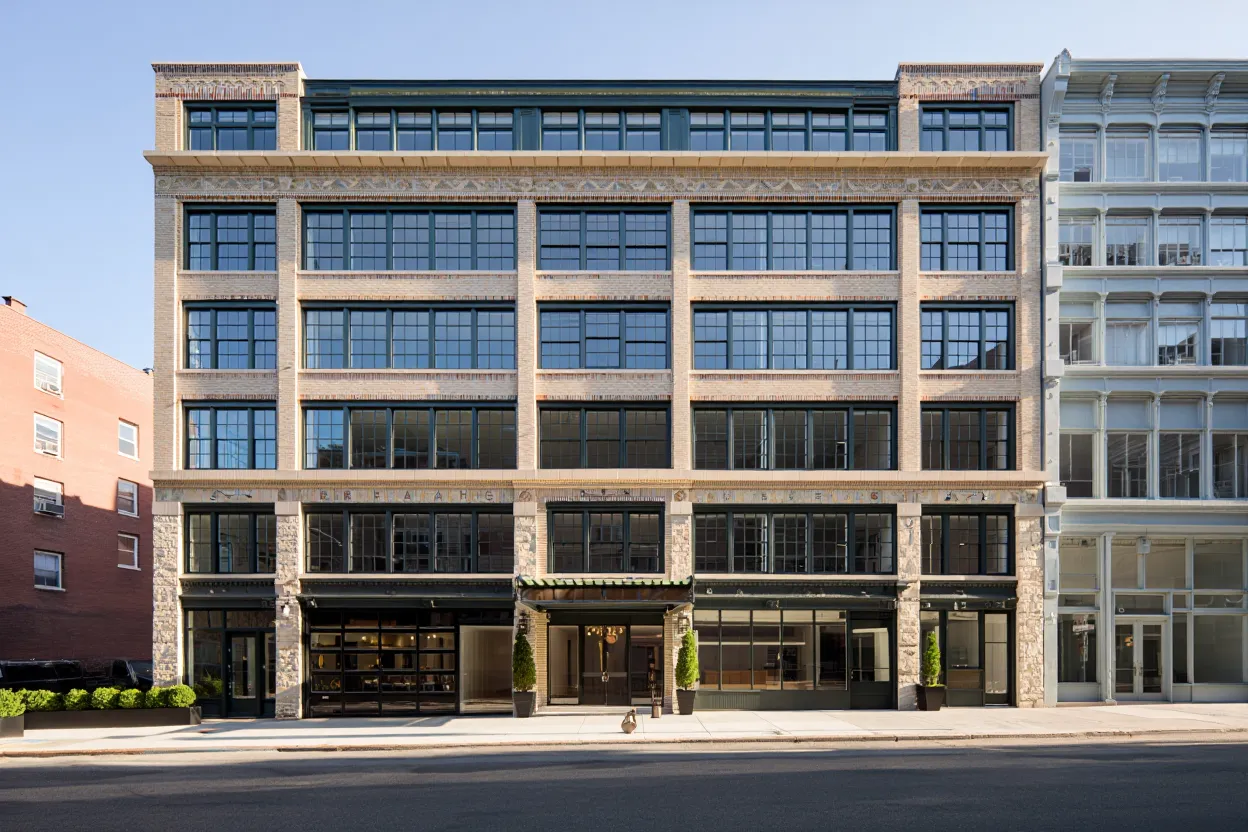Manhattan’s Class B Office Market Faces Tightening Supply
While Manhattan’s flashy Class A towers remain packed, a surge in leasing is now targeting older, less glitzy Class B buildings.
Good morning. As Class A towers fill up, tenants are flooding into Manhattan’s best next class down, but inventory is shrinking fast. Plus, Developers are increasingly opting to sell fully entitled Miami sites due to rising construction costs.
Today's issue is sponsored by Lev—the data and workflow platform for CRE financing.
Join CRE Daily tomorrow at the Harvard Real Estate Symposium — 500+ alumni, industry thought leaders, and fast-paced panels on the industry’s biggest challenges. 🎟️ Get 10% off with the CRE Daily discount — register here!
Market Snapshot
|
|
||||
|
|
*Data as of 04/24/2024 market close.
SUPPLY PINCH
Manhattan’s Class B Office Market Faces Tightening Supply
Class B office space in Manhattan is suddenly the city’s hottest leasing ticket—just as the supply starts to vanish.
Demand shifts down: With Class A towers at near-full occupancy, leasing momentum is spilling into B-plus buildings—older, well-located assets with just enough upgrades. These spaces saw 8 million square feet leased in Q1 2025, the highest post-pandemic total and nearly 25% above the 10-year average.
Conversions erode supply: Zoning changes and tax incentives are fueling office-to-residential conversions, hitting the Class B sector hardest. More than 6.5 MSF have already flipped since 2020, and pending projects could triple that. These conversions not only reduce supply but often displace current tenants, driving further competition for space.
Zoom in: Sublease availability has dropped for eight straight quarters, hitting 3.33 million square feet—its lowest level since July 2020. With fewer tenants exiting space, and more companies calling workers back to the office, Class B availability is drying up quickl
Costly appeal: Class B space rents up to $25/SF cheaper than Class A in areas like Midtown South, making it an attractive option. But the affordability comes at a cost: tenants now expect turnkey buildouts, which push landlord expenses up to Class A levels, squeezing margins for all but the most capitalized owners.
Big names, bigger commitments: Major tenants are anchoring this Class B surge:
-
Amazon (via WeWork): 303,741 SF
-
IBM: 92,663 SF at One Madison
-
Horizon Media: 360,000 SF for 17 years
-
Goodwin Procter: 250,000 SF in a 116-year-old building
-
Plus moves from BuzzFeed, Capital One, A&E, and the Archdiocese of New York
➥ THE TAKEAWAY
Class B is hot—but for how long? While demand is surging and space is tightening, the model has thin margins and relies heavily on capital-intensive upgrades. A tech pullback or economic downturn could quickly cool this rally. Until then, only the landlords with strong balance sheets are likely to thrive in this new “B-is-the-new-A” moment.
TOGETHER WITH LEV
Use data and AI to get the best CRE financing
Lev is a software platform for CRE financing that combines the industry's largest source of real-time lender data with purpose-built AI.
Sponsors and brokers use Lev to connect with the best-fit lenders for their deals, manage their existing lending relationships and automate the most time-consuming parts of the financing process.
The results: better term sheets, deeper lender connections and meaningful time-savings across every deal.
CRE Daily readers can try Lev risk-free with a no-obligation free first deal.
*This is a paid advertisement. Please see the full disclosure at the bottom of the newsletter.
✍️ Editor’s Picks
-
Ownership premium: Homeownership now costs 25% more than renting, widening the gap to a 15-year high and reshaping rental demand, occupancy trends, and investment strategies. (sponsored)
-
Land liquidation: As costs rise and uncertainty looms, Miami developers are backing away from building plans and putting entitled sites on the market.
-
Tax trap: Rising tax rates are compounding falling commercial property values, squeezing landlords and tenants while destabilizing markets.
-
Heart smart: NY’s CRE industry is backing the American Heart Association to promote CPR training and heart health, turning offices into lifesaving communities.
-
Sales slump: March home sales fell to their slowest pace since 2009 as high mortgage rates, rising inventory, and economic uncertainty put pressure on the spring housing market.
🏘️ MULTIFAMILY
-
Pipeline pressure: Multifamily construction completions will remain elevated in 2025 before declining sharply through 2027, as falling starts, longer build times, and policy uncertainty reshape the development outlook.
-
Exit strategy: Adam Neumann’s Flow is poised to sell its stake in a 425-unit Buckhead apartment tower, as Atlanta-based Cortland prepares to take over ownership.
-
Capital freeze: DC housing starts plunged 79% as high interest rates, rent arrears, and investor flight stall development and threaten the city’s economic outlook.
-
Tower ambitions: Jacmar Companies is planning a 13-story, 100-unit Art Deco-style apartment tower in Santa Monica, marking its boldest bid yet to redevelop its Lincoln Boulevard site.
-
Island investment: Martha’s Vineyard Hospital is spending $38M to build 48 apartments for staff, aiming to combat the island’s affordability crisis and retain essential workers.
🏭 Industrial
-
Warehouse windfall: In their latest big-ticket portfolio deal, Blackstone and Link sold three South Florida industrial sites to Ares for $121M.
-
Resilient sectors: Industrial and multifamily assets stand to gain from shifting trade dynamics, with markets like the Texas Triangle and Phoenix as top contenders.
-
Austin acquisition: Buchanan Capital acquired the last warehouse in Hutto’s Innovation Business Park, signaling strong demand for Austin industrial near Samsung’s chip plant.
-
Portfolio trade: Ares Management acquired a $120.5M South Florida industrial portfolio from Blackstone, adding three warehouses in Miramar and Dania Beach.
🏬 RETAIL
-
Wait and see: New tariffs are causing retailers to delay lease deals, adding uncertainty for landlords and brokers.
-
Shopping shift: Class B malls are becoming prime targets for mixed-use redevelopment, as outdated centers face declining traffic.
-
Supermarket sweep: A&N Food Market sold its Flushing property housing Great Wall Supermarket for $27M to two local investors.
-
Brooklyn footprint: Acadia Realty Trust acquired three retail buildings on Williamsburg’s North Sixth Street for $60M from City Urban Realty.
🏢 OFFICE
-
Rent dispute: SL Green is suing One Vanderbilt tenant Tennor Holding B.V. for $15M in unpaid rent after alleged defaults on both temporary and long-term leases.
-
Miami refi: The Green Cos. landed a $51.5M, 10-year refi from Goldman Sachs for its 93% leased Dadeland Centre campus, highlighting Miami’s strengthening office market.
-
Brickell boost: Brickell led South Florida’s office market in Q125 with strong Class A demand, rising rents, and falling vacancies, despite new supply still awaiting occupancy.
🏨 HOSPITALITY
-
Famed flat: A Plaza Hotel condo once home to Frank Lloyd Wright has gone into contract after listing for $18.9M, drawing interest with its Central Park views and storied past.
-
Hotel recap: Driftwood Capital completed a $415M recap of an 18-hotel portfolio across 10 states, signaling continued confidence in high-growth hospitality markets.
📈 CHART OF THE DAY

In March 2025, YoY rent trends showed signs of recovery in the self-storage market, with climate-controlled (CC) units posting a 0.1% gain, outpacing non-climate-controlled (NCC) units, which declined 0.5%, according to Yardi. This marked the second consecutive month CC units led rent growth.

You currently have 0 referrals, only 1 away from receiving Multifamily Stress Test Model.
What did you think of today's newsletter? |




















